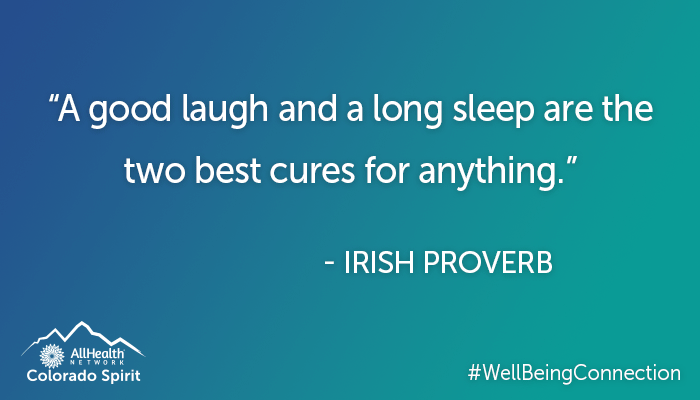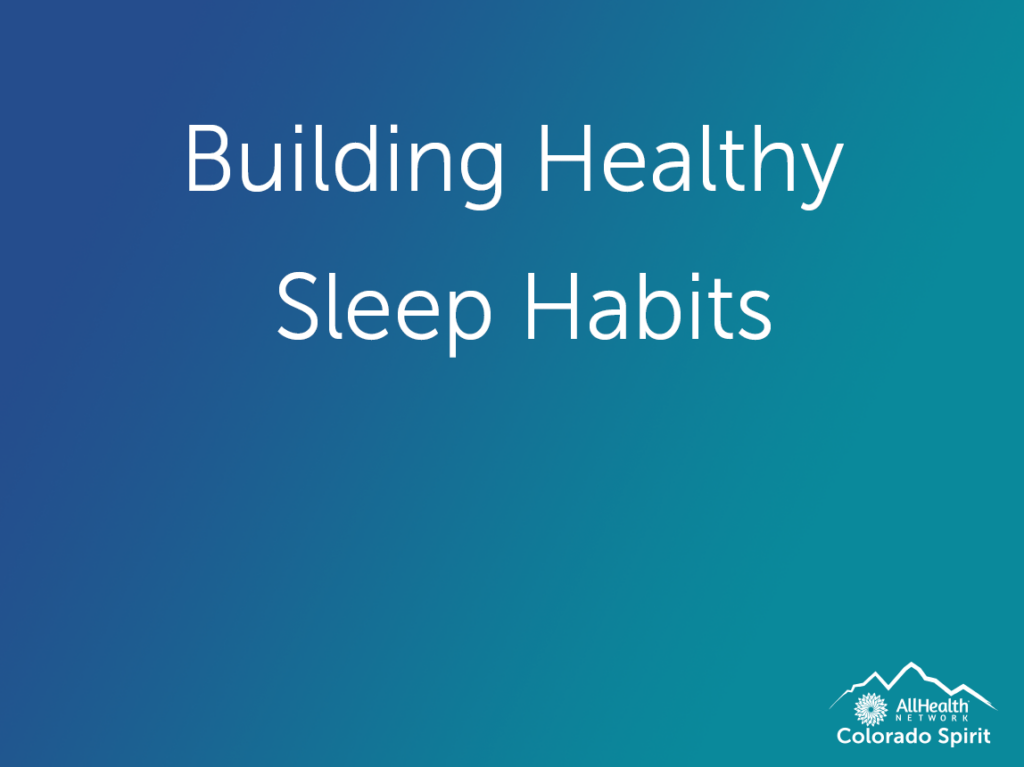Many thanks to Colorado Spirit Counselor, Chelsea Nibert for writing this week’s piece.
Fun Fact: One-third of Americans don’t get enough sleep on a regular basis, according to the CDC.
If you are one of these people, follow along for some tips from the Colorado Spirit team at AllHealth Network to create a consistent nighttime routine that promotes sound and restful sleep. First, what is a nighttime routine? Practicing a consistent set of steps leading up to bedtime is a simple lifestyle change that we can all incorporate to help our mind and body relax before bed.
The top benefits of a consistent nighttime routine
According to The Sleep Foundation :
- Reducing late-night stress and anxiety
- Relieving cranky infants and their parents, helping children fall asleep faster and wake up less frequently during the night
- Helping to establish healthy, lasting habits
- Connection with a natural circadian rhythm
With these benefits in mind, let’s explore some of the components of a good bedtime routine.
Deciding on a set bedtime can help us transition into a natural sleep-wake cycle that leaves us feeling rested each morning. This set bedtime requires anywhere between 30 minutes and 2 hours of wind-down time depending on the day you’ve had, the steps in your routine, and your personal preference. Over time, this set bedtime will remind our bodies that it is almost time for sleep, and we will begin to naturally feel tired around the time we’ve set for ourselves.
Pro Tip: Set an alarm for your wind-down time
Next, and one of the more difficult of these, leaving electronics alone. This includes cell phones, laptops, and TVs. And, despite what we hoped, that Netflix show is not helping us relax. The blue light that is emitted from these screens tricks our bodies into thinking that it is still daytime. Plus, we’ve all been caught staying up way too late due to our favorite show keeping us hooked. So, ditching the screens when you begin your bedtime routine can aid in our bodies’ natural ability to fall asleep.
Pro Tip: Turn on your phone’s red-light filter so it won’t be as disruptive if you do need it at night.
If we find that it is difficult for our bodies to wind down around this time try taking a warm bath. When we prepare to fall asleep, our bodies’ core temperature drops, and we begin to produce melatonin . If we find that we are not doing this on our own, a warm bath can trigger a similar sleepy reaction. This way, our bodies will heat up from the bath, and then cool down when once we get out and the water evaporates. This can create a sleepy sensation. This process causes us to feel tired and relaxed.
Pro Tip: Throw your towel in the dryer beforehand or have your favorite cozy outfit to put on after getting out of the bath.
Lastly, find a practice that works best for you. This could involve reading/listening to a book, stretching, breathing, meditating, or journaling. Do the practice that works best for you on a consistent basis in the calming space that you have prepared for yourself so that you look forward to this part of your evening. To prep this space, make sure the area is dim, slightly cool, and as quiet as possible.
Pro Tip: Keep this space as tidy as possible to eliminate any stress and add in your favorite scent with a candle or diffuser.
Finally, try your best to prepare for obstacles that may impact our bedtime routine. These can include disruptions by partners and pets, insomnia, uncontrollable media consumption, and anxiety about waking up early. Plan ahead to prioritize this time and give yourself grace if the routine does not go according to plan each and every night. As always, for persistent sleep disorders reach out for assistance and support when you need to.

If speaking to someone would help, please reach out.
AllHealth Network provides several supports:
- To speak with someone in the Colorado Spirit Program about stress related to the pandemic, please call 720-707-6789 or visit our webpage at allhealthnetwork.org/Colorado-Spirit
- For information about other services at AllHealth Network or to get connected with ongoing behavioral health support, please call 303-730-8858. AllHealth Network is continuing to provide service via telehealth or by phone and our Crisis Walk-in Center remains open 24/7.
If you are experiencing a mental health crisis and are in need of immediate assistance, please call the Colorado Crisis Hotline at 1-844-493-8255 (TALK) or text TALK to 38255.
How do you know if you’re experiencing a mental health crisis? Click here to learn about mental health crisis warning signs to look out for from the National Alliance on Mental Illness (NAMI).
Be sure to follow us on Facebook to receive information about our free groups and get notifications when we post coping tips, mindfulness suggestions, and more.

 Skip to content
Skip to content